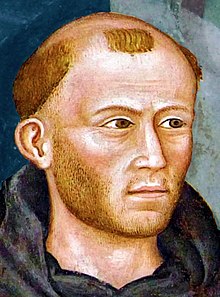
Back Meester Eckhart Afrikaans Meister Eckhart ALS ميستر إكهرت Arabic ميستر اكهرت ARZ Mayster Ekhart Azerbaijani مایستر اکهارت AZB Майстер Екхарт Bulgarian Mestr Eckhart Breton Mestre Eckhart Catalan Mistr Eckhart Czech
Eckhart von Hochheim | |
|---|---|
 Postmortem portrait of Meister Eckhart, circa 1366 | |
| Born | 1260 |
| Died | 1328 (aged 67–68) probably Avignon, Kingdom of Arles, Holy Roman Empire |
| Era | Medieval philosophy |
| Region | Western philosophy |
| School | |
Main interests | Religion, Spirituality, Theology |
Notable ideas | Ground of the Soul |
Eckhart von Hochheim OP (c. 1260 – c. 1328),[1] commonly known as Meister Eckhart (pronounced [ˈmaɪstɐ ʔˈɛkaʁt]), Master Eckhart or Eckehart, claimed original name Johannes Eckhart,[2] was a German Catholic priest, theologian, philosopher and mystic. He was born near Gotha in the Landgraviate of Thuringia (now Thuringia in central Germany) in the Holy Roman Empire.[a]
Eckhart came into prominence during the Avignon Papacy at a time of increased tensions between monastic orders, diocesan clergy, the Franciscan Order, and Eckhart's Dominican Order. In later life, he was accused of heresy and brought up before the local Franciscan-led Inquisition, and tried as a heretic by Pope John XXII with the bull In Agro Dominico of March 27, 1329.[3][b] In the trial, excerpts of his Book of Divine Consolation were used against Eckhart.[4][5] He seems to have died before his verdict was received.[6][c]
He was well known for his work with pious lay groups such as the Friends of God and was succeeded by his more circumspect disciples Johannes Tauler and Henry Suso, the latter of whom was later beatified.[8] Since the 19th century, he has received renewed attention. He has acquired a status as a great mystic within contemporary popular spirituality, as well as considerable interest from scholars situating him within the medieval scholastic and philosophical tradition.[9]
- ^ Mojsisch, Burkhard; Summerell, Orrin F. "Meister Eckhart". plato.stanford.edu. Retrieved 11 September 2020.
- ^ Meister Eckhart: German mystic by Father Reiner Schürmann, O.P. on Britannica
- ^ Meister Eckhart; Edmund Colledge; Bernard McGinn (1981). Meister Eckhart, the Essential Sermons, Commentaries, Treatises, and Defense. Paulist Press. p. 77. ISBN 978-0-8091-2370-4.
- ^ Stirnimann, Heinrich; Imbach, Ruedi (1992). Eckardus theutonicus, homo doctus et sanctus: Nachweise und Berichte zum Prozess gegen Meister Eckhart. Dokimion. Freiburg (Schweiz): Universitätsverl. ISBN 978-3-7278-0773-2.
- ^ "Meister Eckhart und seine Zeit". www.eckhart.de. Retrieved 28 July 2024.
- ^ Colledge, Edmund (1981). "Historical Data". Meister Eckhart: The Essential Sermons, Commentaries, Treatises, and Defense. Colledge, Edmund., McGinn, Bernard. New York: Paulist Press. p. 12. ISBN 0-8091-0322-2. OCLC 8410552.
- ^ John XXII (27 March 1329). "In Argo Dominico". Meister Eckhart: The Essential Sermons, Commentaries, Treatises, and Defense. Colledge, Edmund., McGinn, Bernard. New York: Paulist Press, 1981. p. 81. ISBN 0-8091-0322-2. OCLC 8410552.
- ^ McMahon, Arthur. "Blessed Henry Suso". New Advent. Retrieved 22 December 2024.
- ^ Hackett 2012.
Cite error: There are <ref group=lower-alpha> tags or {{efn}} templates on this page, but the references will not show without a {{reflist|group=lower-alpha}} template or {{notelist}} template (see the help page).